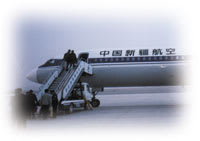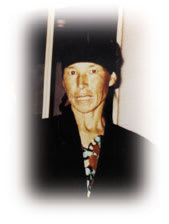PERCEPTIONS
A Journey to the Unknown
A retina specialist experiences the other side of the world.
By James Y. Hung, M.D.,
Fresno, Calif.
Xinjiang is an interesting place. Remote desolate, it has the distinction of being the largest province in China, with a population of 16 million.
I traveled to Xinjiang in June of 2000. I'd been to China many times, but Xinjiang was one part I'd never been to.

The IL 86 flew me to the capital of Xinjiang, Ürümqi. It was a direct 4-hour flight. (Ürümqi is farther from an ocean than any other city in the world.)
The purpose of my trip was to perform operations at the Ürümqi Eye Hospital, in the center of the city. The hospital provided me with a chauffeur because the streets of Ürümqi change names every few blocks. (My chauffeur drove me around in an ambulance!)
Ürümqi Eye Hospital had a staff of about 80 personnel; 13 were ophthalmologists. Because Xinjiang is one of the poorest provinces of China, doctors earn only $100 a month. The head of the hospital, Dr. Wen Chang, makes $180 a month.
The hospital had no laser. I brought bands, sutures, my indirect ophthalmoscope and other handheld instruments. I performed 30 operations, mostly retinal reattachments, with Dr. Wen's assistance.
One patient I operated on was a 17-year-old young man, Hussein, who had been blind in the right eye since age 8, when a tree branch struck him while he was tending sheep. He came to see me because of a sudden onset of a dark curtain extending from below on his left eye, which eventually blocked his vision completely. His vision was so bad that his father had to lead him to the hospital.
I reattached Hussein's left retina. Three days later, he was able to see the face of his father. When I left Ürümqi 2 weeks later, Hussein was able to get around.
In China, it's common for hospitals to keep patients for weeks. Many patients, like Hussein, travel by bus for 3 or 4 days just to get there. They stay at hospitals a long time because the hygiene is better than at their homes.

Six weeks before my arrival, Parida's local ophthalmologist detected a detached retina in her left eye. Usually, this would've been left untreated because Parida is a peasant. But being the wife of a prominent member of her tribe, she was sent to the hospital when I happened to be there. I reattached her retina.
Recently, I received a letter from the teacher of one of Parida's children. (Parida had the teacher write to me because Parida is illiterate.) The teacher wrote that Parida was able to sew again, and noted that before the surgery Parida had difficulty caring for her four young children with just her right eye.
Parida's letter made me realize how proud I am to be an ophthalmologist. What other specialty can change a person's life so much in just 1 or 2 hours?
Parida's letter also made me think about my next trip to Xinjiang. I'll bring bands, sutures and my indirect ophthalmoscope, of course. But this time I'm also going to bring my Iris Medical laser.
Want to tell your story? CALL John Osborn at (215) 643-8055, E-MAIL to osbornjs@boucher1.com, FAX to 215-643-3902, or WRITE to 1300 Virginia Dr., Suite 400, Ft. Washington, Pa. 19034. Offer a few thoughts, and we'll take care of the rest.








